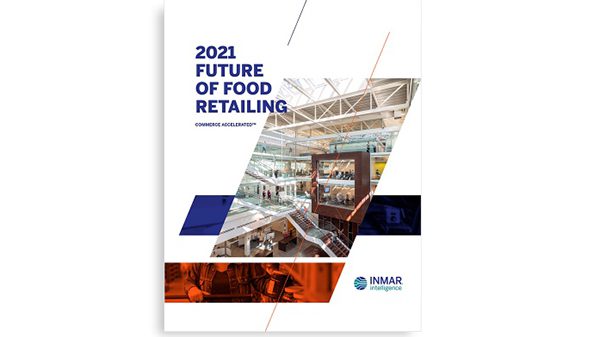Winston-Salem, NC, Sept. 23, 2021 (GLOBE NEWSWIRE) — Inmar Intelligence, a data and tech-enabled services company, released today its 2021 Future of Food Retailing Report, which provides a detailed look into the food retailing industry in order to identify and quantify market dynamics, trends and behaviors. In this annual report, Inmar Intelligence recaps the previous year’s activities and provides projections for the next five years in terms of dollar share and store count for Traditional Grocery (traditional supermarkets, fresh format, limited assortment, super warehouse and small grocery), Non-Traditional Grocery (wholesale club, supercenter, dollar/extreme value, drug, mass merchandisers and military) and Convenience Stores (with and without gasoline).
Traditional Grocery experienced an overall 10.9 percent increase in sales in 2020, growing to $623.3 billion from $562.3 billion in 2019. This channel saw the highest year-over-year percent boost in sales, resulting in a 1.9 percent year-over-year increase in dollar share to 44.4 percent, a reversal of the share losses in 2018 and 2019 to Non-Traditional Grocery. In addition to the sales increase, Traditional Grocery store count increased 0.6 percent to 40,616 locations at the end of 2020. The largest store count increase was within Limited Assortment, while Super Warehouse had a 16.2 percent store count year-over-year decline.
E-commerce sales of grocery and consumable items grew 48.9 percent year-over-year to $119.0 billion in 2020, driven by a 74 percent increase in digital sales of food and beverage. This increase is partially attributed to partnerships between retailers and third-party shopping and delivery services, like Instacart (100 percent year-over-year increase in partners) and Target (partnership with Shipt saw 300 percent increase in same-day deliveries).
“Digital acceleration is affecting the long-term growth plans of food retailers and manufacturers,” said Jim Hertel, Senior Vice President at Inmar Intelligence. “Consumers have convenience at their fingertips with the option to order groceries online, yet in-store sales are climbing back up to pre-pandemic levels. So for retailers across the board, now is the time to build loyalty through digital hybrid experiences. These personalized engagements on digital and tailored and thoughtful in-store experiences will help meet expectations now, which will solidify loyalty in the long run.”
Over the next five years, Inmar Intelligence expects that there will be an overall return to pre-pandemic channel trends. The growth of Traditional and Non-Traditional Grocery will come at the expense of the Convenience format — small stores that sell staple groceries, non-foods, and ready-to-eat foods designed for easy and quick access, and can include gasoline. This format is projected to continue to decline from 15.2 percent of dollar share in 2020 to 12.9 percent in 2025.
Additional forward-looking findings from the report include:
- Following the expedited growth rate of e-commerce sales in 2020, digital sales of grocery and consumable items are expected to see a steady Compound Annual Growth Rate (CAGR) of 18 percent from 2020 to 2025, reaching the equivalent of 15 percent -20 percent of 2025 dollar share
- The sales growth in 2020 for Traditional Grocery will help the channel maintain dollar share through 2025, slightly increasing to 45 percent
- Super Warehouse will continue to see the biggest sales decline across all formats with a CAGR of -9.6 percent from 2021 to 2025, falling to below 1.0 percent of 2025 dollar share, due to a projected 60 percent drop in store count
To review the full 2021 Future of Food Retailing report, please visit https://www.inmar.com/blog/research/2021-future-food-retailing-report.
About Inmar Intelligence
Commerce Accelerated.™
Inmar Intelligence is a leading data and tech-enabled services company. $120 billion dollars of commerce runs through our market-driven platforms which are propelling digital transformation through unified data, workflows and fund flows to help companies drive innovation and achieve digital transformation. Our integrated workflows create insights through Analytics, AI, Machine Learning and to drive faster actions and outcomes.
Throughout our 41-year history, we have served retailers, manufacturers, pharmacies, health systems, government and employers as their trusted intermediary in helping them redefine success. For more information about Inmar, please follow us on Twitter, LinkedIn or Facebook, or call (866) 440-6917.



